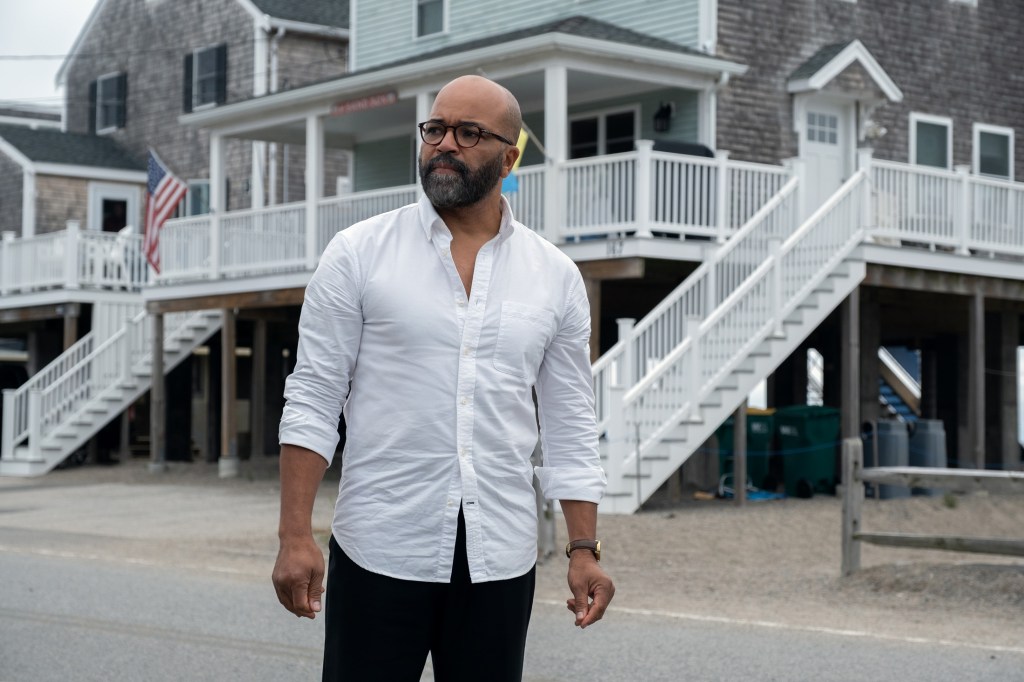What do you think about when you hear the phrase “black cinema”? If you were to base your answer off of how Rotten Tomatoes has described some recent Best Picture nominees, it’d be hard not to notice a pattern.
Take Lee Daniels’ 2009 film, for example. “Precious is a grim yet ultimately triumphant film about abuse and inner-city life.” Or 2011’s The Help: “In 1960s Mississippi, [a] Southern society girl … turns her small town on its ear by choosing to interview the black women who have spent their lives taking care of prominent white families.” Or the 2014 Best Picture winner: “It’s far from comfortable viewing, but 12 Years a Slave’s unflinchingly brutal look at American slavery is also brilliant—and quite possibly essential—cinema.”
Slavery. Segregation. The inner city. Repeat.
These aren’t bad films by any means, but their repetitive themes do reflect a reductive sense of what “black stories” should be. That’s the main gripe that writer-director Cord Jefferson explores in his thoughtful new film, American Fiction. It’s a hilarious and often cathartic watch for those frustrated by progressive pieties of race—but it also falls short of handling them as fully as it could have.
American Fiction stars the ever-composed Jeffrey Wright as Thelonious “Monk” Ellison, a Los Angeles-based college professor who writes novels inspired by Ancient Greek plays. He’s brainy, aloof, and kind of pretentious—but he hasn’t sold many books in a while. As his agent tells him, publishers don’t see what a modern retelling of Aeschylus’ “The Persians” says about “the black experience.”
Monk has no patience for that sort of thing. “They have a black book!” he quips. “I’m black, and it’s my book!” Early in the film, he’s voluntold to take time off after a classroom incident involving Flannery O’Connor and the notorious racial epithet. A student says she’s not “comfortable” seeing or hearing the word. “With all due respect,” Monk jabs back, “I got over it, Brittany, I’m pretty sure you can too.”
So Monk returns to his childhood home in Boston and reunites with his sister Lisa (Black-ish’s Tracee Ellis Ross), his mother (Leslie Uggams), and—following an untimely tragedy—his recently out brother Cliff (Sterling K. Brown at the top of his game). He suddenly finds himself responsible for an array of comfortably boboish concerns: childhood hangups, messy divorces, an Alzheimer’s diagnosis, and financial pressures that might force them to sell their beach house.
Amid these personal and professional stressors—and frustrated by the notoriety of We’s Lives In Da Ghetto, a new release by the Oberlin-educated black author Sintara Golden (Issa Rae) that affirms the stereotypes he so loathes—Monk puts on an elaborate literary joke. Over a few glasses of liquor, he composes My Pafology, an overwrought mockery of the “black” books replete with “deadbeat dads, rappers, [and] crack” that publishers crave. He slaps a pseudonym on it, sends it to his agent, who sends it to publishers who … offer $750,000 for the rights. A $4 million movie deal soon follows.
The suits didn’t get the joke. They think they found the next “gritty” or “urgent” race-conscious hit.
Part of the ingenuity of American Fiction is how it manages to blend and reinforce Monk’s two main storylines. Monk’s family drama is often interrupted by his fake-novel narrative, much like how cliches about race overshadow other aspects of “black” books or movies. In this case, however, that same obfuscation develops the film’s narrative. Precisely because of his frustration over the success of My Pafology—which gets an outlandish and profane rebrand in one of the movie’s funniest scenes—Monk shuts off those closest to him. Race, once again, intrudes on the personal.
Moreover, this interplay between the racial and personal storylines helps us understand our protagonist. After writing for years with little notice, Monk’s long-awaited success doesn’t really feel “his.” It’s a lucrative farce, but a farce nevertheless—pseudonymous and emblematic of racial trauma porn that flattens black individuals. “I’m not saying these things aren’t real, but we’re also more than this,” he tells Golden. Late in the film, in one of its most heartfelt scenes, Cliff laments that their late father never knew that he was gay. “Well, what if he had known and rejected you?” Monk asks. Cliff replies, “At least he’d be rejecting the real me.” That lands for Monk.
At its best, American Fiction shows how much harder our persistently race-conscious mindset makes it to see the real individual behind a black character. It’s an essential idea to explore, one that’s only begun gaining mainstream cachet. For all the worries on the right about woke excesses, it should give us some comfort to know that one of the year’s most critically acclaimed movies—which snagged the Toronto Film Festival’s People’s Choice Award, a slew of industry prizes, and three very deserved acting SAG nominations just this week—openly scoffs at these habits of mind.
Which is why the main drawback to American Fiction seems like it could have been so easily prevented. The film’s spot-on criticism of wokeness ends up turning its white progressive characters into caricatures.
Take a scene when Monk and four other writers (three of whom are white, the other is Golden) are judging his pseudonymous book for a literary award. Golden, to Monk’s surprise, thinks the book is “pandering.” The three white authors, however, are all enthralled by it. “Personally, I adored it—it was like gazing into an open wound,” says one. “This is a gutsy piece of work, and necessary for the times,” another adds.
It’s unclear why the film chooses to make the white publishers, studio heads, or authors so simplistic. Perhaps it’s an intentional role reversal; after all, black characters are often reduced to a few traits or characteristics. Perhaps it’s just satire doing its thing. But it’s also easy to imagine the film making its point with more complexity. To take the literary award scene, the film could have shown the white writers feeling conflicted about Monk’s fake book—recognizing it as bad literature, feeling guilty or worried about not rewarding it, and ultimately rationalizing their praise. Instead, the film leaves the motivations of its white progressive characters largely incomplete, and that’s a pretty unmissable drawback for a movie about incomplete stories.
Nevertheless, American Fiction has so much more going for it. (The onscreen chemistry between Wright and Brown is especially effective, depicting brotherly love with a proper dose of jabs.) If the film’s main objective had been only to depict a “black story” that subverts black stereotypes, it would have succeeded. But it attempts to do something more: to use those very stereotypes to deliver a fresh, slice-of-life movie. In that regard, American Fiction feels incredibly real.







Please note that we at The Dispatch hold ourselves, our work, and our commenters to a higher standard than other places on the internet. We welcome comments that foster genuine debate or discussion—including comments critical of us or our work—but responses that include ad hominem attacks on fellow Dispatch members or are intended to stoke fear and anger may be moderated.
With your membership, you only have the ability to comment on The Morning Dispatch articles. Consider upgrading to join the conversation everywhere.